Asbestos Removal Salford Greater Manchester (M5): Responsible for around 5,000 deaths every year (according to the Health and Safety Executive), asbestos is categorised as a material that is a health hazard. You need to speak to an expert in the field of asbestos removal before you begin any work, if you discover asbestos in your home or business premises in Salford. Even if you think a material is asbestos during building or remodeling work, you must stop straight away and bring in an asbestos surveyor to inspect the area. So as to be able to give advice on the best method of removal and disposal, a professional Salford asbestos removal specialist will check out the suspect material and fully evaluate the situation.
It may be discovered during the survey that you don't have to use a HSE certified contractor for removing and disposing of the asbestos. But, on account of the permanent effects to health from asbestos dust and fibres, it is always preferable to use qualified asbestos professionals. There are numerous regulations in the asbestos industry with which an experienced Salford asbestos removal contractor must comply in safely removing and disposing of any asbestos compounds.
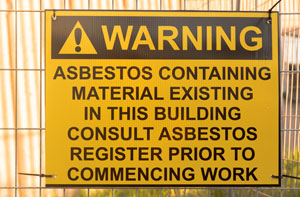
HEALTH DANGERS FROM ASBESTOS
You do not need to be concerned unnecessarily about asbestos when it is in your home and left untouched. Asbestos can release minute fibres or particles into the air only when scraped, damaged or cut. If such fibres are inhaled they enter the lungs and become trapped, causing a condition called asbestosis. Lung cancer experts have also identified asbestos particles to be a contributary cause in the disease.
Asbestosis has no known cure, and the damage to the lungs caused by asbestos fibres is irreversible.
Symptoms for asbestosis may include:
- Severe Shortness of Breath
- Pain in Your Shoulder or Chest
- Extreme Fatigue
- Wheezing
- Persistent Cough
You should seek medical advice if you believe you have been exposed to asbestos over a long period of time and you're experiencing symptoms from those mentioned above.
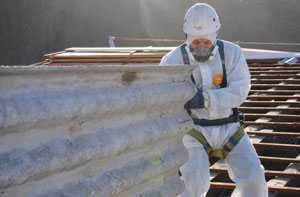
WHAT YOU NEED TO CONSIDER WHEN YOU ARE DEALING WITH ASBESTOS
Structures and properties that were built from 1945 - 1985 are much more likely to have asbestos in their construction than those built after this; asbestos was finally banned in the construction industry in the British Isles after 1999. Those of you who own properties built over this time frame must be cautious when remodeling or doing any structural work because of the increased possibility of finding asbestos. Asbestos was used in items such as pipe lagging, ceiling tiles and boiler insulation and was also used in the form of a spray as an ideal fire-proofing and insulation material.
Finding asbestos in your Salford property does not necessarily add up to an immediate threat. Remember that asbestos is usually only a hazard to health if damaged or disturbed. There are some scenarios where it may be better to leave the asbestos in situ, ensuring it isn't disturbed or damaged. You need to ask for assistance from a professional asbestos removal contractor if you are unclear about the risks posed by any asbestos in your home in Salford.
Not all asbestos products are high risk and call for licensed asbestos removal technicians to tackle them. Roofing panels and asbestos cement sheets are low risk materials, whilst pipe lagging, asbestos insulation boards and loose fill insulation are all classed as high risk. Only an accredited asbestos removal contractor in Salford will be able to recognise, remove and dispose of any products containing asbestos, in a safe, secure and environmentally friendly manner.
If the removing of asbestos has a requirement for a HSE certified contractor to carry out the task, then the local authority or the Health & Safety Executive has to be informed. The Control of Asbestos Regulations 2012 are the guidelines that your chosen asbestos removal contractor must comply with so as to safeguard work areas and people from asbestos dust and fibres.
If you do not hold a recognised Health and Safety Executive asbestos permit you are likely to be prosecuted if you execute any asbestos removal which demands a licensed person to complete the project.
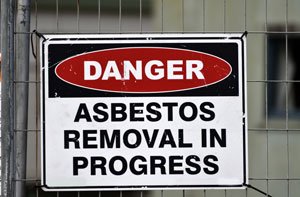
THE DISPOSAL OF ASBESTOS
As soon as any asbestos has been stripped away from your Salford home or business premises it is then classed as hazardous waste. Any hazardous waste, especially that which contains asbestos products, has rigid guidelines for the way in which it can be safely disposed of. A professional asbestos removal contractor will be aware of the appropriate guidelines and laws in the local area for the disposal of hazardous asbestos related waste.
The Carriage of Dangerous Goods Act 2009 (CDG 2009) covers the transport and disposal of asbestos if it is in the form of loose fibres or is damaged and very likely to release hazardous particles. For the safe transport of these dangerous materials, a waste carrier license is necessary and the waste can only be processed in a government recognised hazardous waste site. Your Salford asbestos removal specialist will take responsibility for making certain this is accomplished correctly, and must retain all paperwork concerning the work and disposal for no less than three years.
THE STAGES OF WORK
Before removing any items that may contain asbestos from your Salford property or home, it is wise to confirm the substances that are involved. Only a registered asbestos surveyor or contractor can legitimately verify asbestos and the strategies necessary for removing and disposing of it. If you don't undertake asbestos testing and the building was constructed before 1999, you must assume there probably is asbestos present somewhere and take all the required safety measures.
A licensed asbestos surveyor should be independent of your appointed asbestos removal contractor, and will conduct all surveys, analysis and sampling.
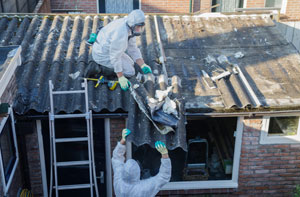
The local authority or HSE must be advised at least fourteen days before any work starts of any asbestos removal that calls for an authorised firm to conduct the work. All legal documentation and required paperwork will be supplied by the asbestos removal specialist and should include: 1. A work declaration outlining the legal guidelines that must be complied with. 2. A method of intent for the asbestos sampling, as well as the techniques for clearing up the work site after completion by following the 4 stages of clearances. 3. All certificates needed for the contractor and its employees to carry out the work, covering; risk assessments, medical, training, work licenses, hazardous waste disposal and sample testing. 4. If required, due to the nature of asbestos removal works, there'll be a comprehensive check of the 4 stage clearance procedure and a Certificate of Reoccupation will then be issued.
The asbestos removal contractor will also provide all personal protective equipment (PPE) for their personnel and make certain that all waste materials are properly secured and transported to a certified waste disposal centre.
QUALIFICATIONS, AFFILIATIONS and PROFESSIONAL BODIES
To help you determine which asbestos removal firm in Salford to choose, you can inquire if they are affiliated with 2 or 3 professional bodies and organisations in the industry.
ARCA - The Asbestos Removal Contractors Association (ARCA), represents professional companies and individuals working within the asbestos trade. Offering an extensive package of support, guidance and training, ARCA is responsible for improving professionalism, safe working practices and reliability for its membership.
UKATA - The United Kingdom Asbestos Training Association is a non-profit agency that is dedicated to raising standards throughout the asbestos industry, by providing the finest quality training and education. They also provide instant validation of individual contractor's and company qualifications by way of their online, searchable database.
ATaC - The Asbestos Testing and Consultancy Association (ATac) provides advice and qualifications for asbestos surveyors, analysts and testing laboratories. It is a UKAS accredited professional association and its members are accepted as specialists in the field of asbestos.
Asbestos surveys and asbestos removal services are available in Salford itself and additionally in nearby towns and villages such as Rainsough, Kersal, Clifton, Eccles, Urmston, Irlam, Charlestown, Swinton, Sale, Ordsall, Seedley, Lower Broughton, Agecroft, Pendleton, Carrington, Stretford, Manchester, Crumpsall, Pendlebury, Prestwich, Cadishead, Weaste, and in these postcodes: M17 1EP, M3 1NH, M3 6BZ, M3 5AA, M3 6BH, M3 5HP, M3 5BX, M3 5DQ, M3 5FT, and M3 5JF. Locally based Salford asbestos removal specialists will probably have the telephone code 0161 and the postcode M5. Verifying this can make certain that you access locally based providers of asbestos removal. Salford property owners will be able to benefit from these and lots of other comparable services. By simply clicking on the "Quote" banner you can obtain asbestos removal quotes from providers nearby.
Asbestos Encapsulation Salford
Asbestos encapsulation is an essential technique used to manage asbestos-containing materials (ACMs) without removing them. This process uses a sealant to coat the ACMs, preventing the release of asbestos fibres. The risk of exposure is significantly reduced by encapsulating the material, which makes the environment safer for occupants.
In contrast to full removal, the main benefit of asbestos encapsulation is its cost-effectiveness. Encapsulation is less disruptive, allowing buildings to remain operational during the process. Moreover, it delivers a durable solution that can last for many years, ensuring long-term protection against exposure to asbestos.
Nonetheless, skilled professionals must carefully plan and execute the encapsulation of asbestos. Regular inspections are required to monitor the condition of the encapsulated material and ensure the sealant remains intact. If any damage occurs, immediate repair is crucial to ensure safety and follow health regulations. (Asbestos Encapsulation Salford)
Asbestos Surveys Salford
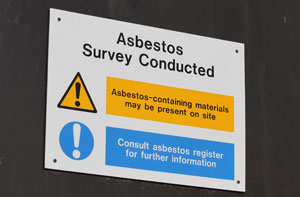
Asbestos in some form or other is often found in buildings constructed in Salford in the period 1850 to 1999. Thanks to its heat and chemical resistant properties, it was an extremely popular building material for over 100 years. It was found to be the cause of some serious health conditions such as ovarian cancer, atelectasis, asbestosis, bile duct cancer, lung cancer and mesothelioma during the 1970s and 1980s.
In 1985 both blue (crocidolite) and brown (amosite) asbestos was banned in the British Isles, and in 1999 asbestos was banned completely. Of course asbestos materials remain in many buildings that were constructed prior to 1999, and for this reason asbestos surveys are necessary in many scenarios, even now.
Buildings in Salford may require either of two different kinds of asbestos survey.
- Asbestos Management Surveys
- Asbestos Refurbishment and Demolition Surveys
Asbestos Management Surveys Salford: The purpose of an Asbestos Management Survey is to keep track of asbestos containing materials (ACMs) during the normal use and occupation of a property or building in Salford. Asbestos containing materials when undisturbed and in good condition are not dangerous to occupants. But, risks may occur if they are disturbed, damaged or in less than perfect condition, and asbestos fibres are discharged into the air.
Asbestos Refurbishment and Demolition Surveys Salford: Asbestos Refurbishment and Demolition Surveys are performed on buildings in Salford that are due to be demolished or renovated. In most cases ARD surveys are performed on buildings that are vacant or unoccupied, because a substantial amount of structural damage can result from one of these surveys. These must be completed before the commencement of any upgrading, demolition or refurbishment work. This will find any asbestos containing materials that exist in the building and determine how such materials can be managed safely or removed. Commissioning these surveys is a responsibility of occupants, professionals and management agents involved in these refurbishments, regardless of their size.
Types of Asbestos
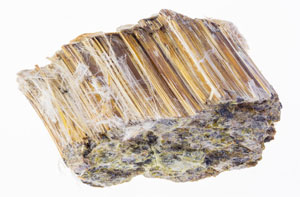
Regularly used in both the construction and manufacturing industries from the late 19th century until it was banned in the United Kingdom in 1999, asbestos is a fibrous material that occurs naturally on every one of the world's continents. There are six different kinds of asbestos, and all are minerals belonging to the amphibole and serpentine families, namely - amosite, chrysotile, crocidolite, tremolite, anthophyllite and actinolite.
It's beyond the scope of this brief article to consider all but the three primary types - crocidolite, chrysotile and amosite.
Chrysotile (White Asbestos) - The most commonly used form of asbestos was chrysotile asbestos, also known as white asbestos. This is still frequently found in the walls, insulation, roofs, ceilings and floors of Salford homes and businesses. It was also used in manufacturing to produce brake linings, boiler seals, pipe & duct insulation and gaskets.
Crocidolite (Blue Asbestos) - Frequently used in the manufacture of spray-on coatings, cement products, plastics and pipe insulation, and also for insulating steam engines, crocidolite (often called blue asbestos) is the most dangerous of all the asbestos minerals.
Amosite (Grunerite or Brown Asbestos) - Frequently used in the manufacture of insulating board, pipe insulation, fire protection, cement sheets, roofing materials and vinyl tiles, amosite asbestos (grunerite) is also called brown asbestos. It was mostly mined in South Africa.
Interesting Fact: An interesting but scary fact is that asbestos was even used to make filter cigarettes, so smokers were unwittingly breathing this harmful material directly into their lungs during the fifties. At that time it was touted as a health benefit, which makes it even more implausible! Indeed, the makers of Kent Micronite cigarettes, namely Lorillard Tobacco, must get the "blunder of the century" award for encouraging their customers to stick the most deadly form of asbestos material (crocidolite) into their mouths. The victims affected by this outrage are still making million dollar settlement claims even today. Many of the victims suffered from an aggressive and rare form of cancer called mesothelioma.
Asbestos Garage Roof Removal Salford
Safely getting rid of old roofing materials containing asbestos is part of asbestos garage roof removal. Asbestos, known for its durability and fire-resistant properties, was widely used in roofing, though it is now known as a serious health hazard. Professional handling and special care are required to securely remove an asbestos roof and stop harmful fibre release.
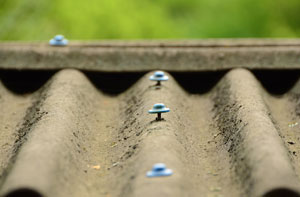
The initial step in asbestos garage roof removal is to hire a licensed asbestos removal company. These professionals are qualified to safely dismantle and dispose of asbestos materials. To ensure their safety and prevent contamination, they will seal off the area and use protective gear.
After the roof is removed, the asbestos material is meticulously packaged and taken to a certified disposal site. To ensure no asbestos fibres remain, the removal team will thoroughly clean the area. This process ensures the garage safe for future use and makes sure compliance with health regulations. (Asbestos Garage Roof Removal Salford)
Asbestos Air Monitoring Salford
The assessment of asbestos air monitoring is indispensable in securing safe air quality within areas that could potentially have asbestos fibres. Conducted by licensed specialists, routine air monitoring serves to detect and evaluate airborne asbestos particles. This helps calculate the effectiveness of asbestos abatement procedures, ensuring they meet safety regulations. Continuous monitoring during renovation or asbestos removal projects in Salford helps safeguard occupants and workers from exposure risks. Specialised equipment plays a vital role in asbestos air monitoring, used to collect air samples that are analysed in accredited laboratories. Prompt and accurate monitoring, crucially, safeguards public health and prevents asbestos-related illnesses. (72754 - Asbestos Air Monitoring Salford)
Local Asbestos Removal Enquiries

Recent asbestos removal job postings: Mr and Mrs Edwards need an asbestos removal specialist who can remove some asbestos floor tiles in their detached house in Irlam. In Weaste Mr Andrew Gibson needs an asbestos removal contractor who can remove and dispose of some asbestos insulation boards. In Crumpsall Mr Thomas Hunter needs an asbestos removal contractor who can remove and dispose of some asbestos insulation boards. Ms Jessica Butler was hoping to get a quote from an asbestos removal contractor in Eccles to remove and dispose of some old asbestos cladding material on her property. Ms Victoria Harris was hoping to get a quote from an asbestos removal contractor in Eccles to remove and dispose of some old asbestos cladding material on her property. Mr and Mrs Bailey want an asbestos removal company who'll remove and get rid of some asbestos pipework lagging in their detached house in Prestwich. Ms Jessica Kennedy was wishing to get a price quote from an asbestos removal contractor in Prestwich to remove and safely get rid of some fire doors which contain asbestos in her home. Charles Gibson was hoping to get a quote from an asbestos removal contractor in Manchester to safely remove the asbestos roof from a small barn. In Pendlebury Mr Sean Walsh needs an asbestos removal contractor who can remove and dispose of some asbestos insulation boards. Mrs Nicole Palmer from Ordsall needs somebody who is prepared to remove the artex from a ceiling. Mr and Mrs Moore need an asbestos removal specialist who can remove some asbestos floor tiles in their detached house in Lower Broughton. In Manchester, Jason and Courtney Willis are in search of a specialist who will dismantle and get rid of a partition containing asbestos. Ms Olivia Gibson was hoping to get a quote from an asbestos removal contractor in Pendlebury to remove and dispose of some old asbestos cladding material on her property. Most of these local people conducted a search for "asbestos removal near me" and came across this page on either Google, Yahoo or Bing.
Asbestos Removal Tasks Salford
Asbestos removal experts will be able to help with asbestos van collection in Salford, asbestos cement water tank removal, demolition asbestos surveys, asbestos garage roof removal, asbestos management, asbestos removal services, asbestos sampling in Salford, office clearance, air testing, asbestos removal price quotes, asbestos surveying, asbestos identification, reinstatement services, crocidolite blue asbestos removal in Salford, Artex removal, asbestos ceiling removal, asbestos tile removal, building waste removal in Salford, asbestos waste removal, the removal of asbestos, the identification of ACMs (asbestos containing materials), asbestos roof removal, asbestos demolition strip-outs, the removal of asbestos ceiling tiles, hazardous material management in Salford, asbestos removal, asbestos encasement, asbestos flue removal, landlord asbestos surveys, lead paint testing, and other hazardous waste related jobs. Listed are just an example of the duties that are handled by those specialising in asbestos removal. Salford specialists will be happy to inform you of their whole range of asbestos services.

Other Salford Tradesmen and Services: When you're in need of asbestos removal in Salford, you may also need the services of other specialists, for instance you may need a handyperson in Salford, a landscaper in Salford, a builder in Salford, a carpenter in Salford, property maintenance in Salford, an electrician in Salford, a flooring contractor in Salford, a plasterer/renderer in Salford, SKIP HIRE in Salford, a painter & decorator in Salford, a cleaner in Salford, a demolition specialist in Salford, timber treatment in Salford, or some other Salford tradespeople.
Asbestos Removal Near Salford
Also find: Charlestown asbestos removal, Pendleton asbestos removal, Swinton asbestos removal, Manchester asbestos removal, Carrington asbestos removal, Cadishead asbestos removal, Urmston asbestos removal, Irlam asbestos removal, Crumpsall asbestos removal, Rainsough asbestos removal, Stretford asbestos removal, Lower Broughton asbestos removal, Clifton asbestos removal, Pendlebury asbestos removal, Weaste asbestos removal, Sale asbestos removal, Ordsall asbestos removal, Eccles asbestos removal, Seedley asbestos removal, Kersal asbestos removal, Prestwich asbestos removal, Agecroft asbestos removal and more. Anybody who is looking for asbestos removal, will discover that such services are readily available in all these localities. Householders in these localities can acquire asbestos removal price quotes by clicking here.
More: Removal Contractors, Asbestos Risk Management, Asbestos Risk Management, Asbestos Specialists, Asbestos Removal, Asbestos Removal Services, Asbestos Survey, Asbestos Specialists, Asbestos Removal Services, Asbestos Management, Hazardous Waste Removal, Environmental Cleaning, Asbestos Disposal, Biohazard Removal, Asbestos Inspections, Asbestos Risk Assessment, Removal Contractors, Asbestos Sampling, Asbestos Survey, Waste Removal, Asbestos Surveys, Asbestos Roof Removal, Hazardous Waste Disposal, Artex Removal, Waste Removal, Cheap Waste Removal, Waste Removal, Hazardous Waste Removal, Asbestos Encasement, Asbestos Collection, Asbestos Management, Asbestos Testing, Hazardous Waste Removal, Asbestos Ceiling Removal, Artex Removal.
TOP - Asbestos Removal Salford
Asbestos Removal Quotations Salford - Asbestos Removal Near Me - Residential Asbestos Removal Salford - Asbestos Surveys Salford - Hazardous Material Removal Salford - Biohazard Removal Salford - Asbestos Removal Contractors Salford - Asbestos Encapsulation Salford - Asbestos Disposal Salford


